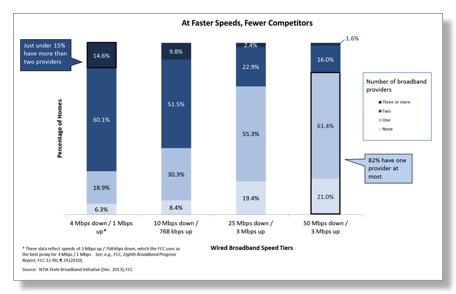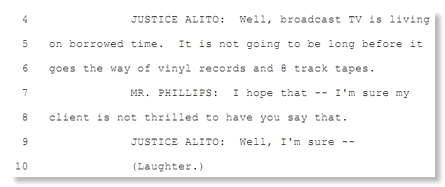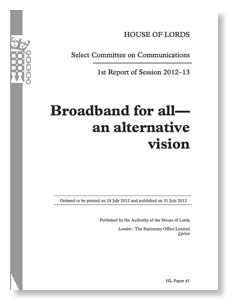Chmn. Wheeler's Speech on Broadband Competition: What Isn't Said About Spectrum Implications

Yesterday, Chairman Wheeler gave a talk entitled The Facts and Future of Broadband Competition” in DC where the above diagram comes from. He introduced the speech as follows:
I want to discuss how the growing bandwidth demands of businesses and consumers are changing the competitive broadband landscape. My goal is not to criticize, but to recognize that meaningful competition for high-speed wired broadband is lacking and Americans need more competitive choices for faster and better Internet connections, both to take advantage of today’s new services, and to incentivize the development of tomorrow’s innovations.
He only uses the word “spectrum” 3 times, on p. 6, in the whole talk:
.Second, where greater competition can exist, we will encourage it. Again, a good example comes from wireless broadband. The “reserve”spectrum in the Broadcast Incentive Auction will provide opportunities for wireless providers to gain access to important low-band spectrum that could enhance their ability to compete. Similarly, the entire Open Internet proceeding is about ensuring that the Internet remains free from barriers erected by last-mile providers.
Third, where meaningful competition is not available, the Commission will work to create it. For instance, our efforts to expand the amount of unlicensed spectrum creates alternative competitive pathways. And we understand the petitions from two communities asking us to pre-empt state laws against citizen-driven broadband expansion to be in the same category, which is why we are looking at that question so closely
We agree with everything he says, but what is telling is what is not said.
The text has the sentence “Today, a majority of American homes have access to 100 Mbps.” This compares well with the statement on p. 9 of the National Broadband Plan (NBP) that “As a milestone, by 2015, 100 million U.S. homes should have affordable access to actual download speeds of 50 Mbps and actual upload speeds of 20 Mbps.” (For reference, Census reports that there are 115,226,802 households in the USA.) Thus at least 57 million homes have access to 100 Mbps, although not necessarily affordable access.
NBP goes on to say
GOAL NO. 3: Every american should have affordable access to robust broadband service, and the means and skills to subscribe if they so choose.
Today’s FCC definition of “broadband” is 4 Mbps which Wheeler calls appropriately “yesterday’s broadband”. He goes on to say, echoing NBP
“high-speed connections are crucial not only for the kind of innovation that will educate our children and deliver quality health care, but also improve energy efficiency, fill the employment ranks, and maintain the United States as the world’s innovation leader for the 21st Century.”
Inside sources tell us that early drafts of NBP mention the impact of this on spectrum: If everyone in the US had access to broadband, even 25 Mbps - already, according to the Chairman on p. 3, 80% have access at some price - why would we the need over the air (OTA) DTV in urbanized areas? The motive for introducing universal broadband is NOT to replace OTA DTV, but rather to move our economy and society forward.
Readers may recall our January 2012 piece on Justice Alito’s comment on OTA DTV during oral arguments:
Unfortunately FCC commissioners are not allowed to make such comments publicly for fear of offending NAB. They even stripped the topic out of the NBP after an early draft leaked to broadcast interests (apparently from 8th Floor sources) and they started getting calls from Congress.
Note that we are not necessarily advocating moving more spectrum from broadcasting to cellular, rather we are saying that the large broadcasting allocations will become more and more untenable as a matter of public policy as broadband penetration increases. This could be accelerated if “free TV” for lower income households could be replaced through freemium basic cable-like service over Internet. All household would be better off with effective broadband. Pumping hundreds of thousands of watts of RF power over several MHz from large transmitter towers in order to qualify for retransmission consent or must-carry could become “so 20th century”! We do not wish the financial demise of the NAB membership, the incentive auction gives them one way to monetize their long term investment.
Your blogger joined FCC spectrum management 35 years ago this month. The world of spectrum use has change considerably in those 35 years with cellular, impact of cellular frequency reuse permitting spectrum productivity that seemed impossible, the upper band of permitted spectrum at 95 GHz, spectrum efficiencies that exceed 1 bps/Hz, DTV, etc. The increasing concentration of spectrum in cellular companies may not be optimal for our society and economy with respect to new spectrum needs we do not understand today just as in 1979 FCC did not appreciate what was coming, e.g. Part 90 was seen as needing much more spectrum then.
While we think that the military needs to be more flexible about its spectrum needs and sharing with the private sector, the US has the largest and most information intensive military in the world and recent events show that for the foreseeable future we face more national security threats that most countries represented in 3GPP. Thus while we may be able to downside or eliminate the need for OTA DTV as broadband penetration reaches new goals, we should not necessarily hand over the spectrum in a way that can not be readily reversed to systems designed in 3GPP for other markets.
NAB should not be able to veto dialogue on the spectrum impacts of broadband penetration just as CTIA should not be able to demand every Hz that “isn’t nailed down”.
UPDATE
As if on cue, the day after this was posted, our home town newspaper had an article entitled “TV is increasingly for old people”. The beginning of the article stated:
The median age of a broadcast or cable television viewer during the 2013-2014 TV season was 44.4 years old, a 6 percent increase in age from four years earlier. Audiences for the major broadcast network shows are much older and aging even faster, with a median age of 53.9 years old, up 7 percent from four years ago.
These television viewers are aging faster than the U.S. population, Nathanson points out. The median age in the U.S. was 37.2, according to the U.S. Census, a figure that increased 1.9 percent over a decade. So to put that in context of television viewing, he said TV audiences aged 5 percent faster than the average American.
Of the networks, Fox has the youngest average viewer age at 47.8 years while CBS has the oldest at 58.7 years. Broadcasting & Cable, the industry’s cheerleader published a similar article on the new data.
A UK Alternative View on Broadband and the Future of Over-the-Air DTV
an alternative vision”. You probably did not see anything about it on US TV news programs, perhaps it was overshadowed by the Olympics. Or perhaps it was too troubling for the networks, or NAB, to address in a timely way. (As of this posting, NAB, CTIA, and Broadcasting & Cable have nothing about this report on their websites.)
(While we learned in high school and from Gilbert & Sullivan that the House of Lords consisted of hereditary peers, the scions of ancient dukes and earls, as a result of reforms in recent decades only 92 out of the present 775 members are hereditary peers, the rest being life peers appointed for life based on their own achievements.)
Here is the header from the article on the Daily Mail’s website:
The end of broadcast TV? House of Lords calls for all channels to go online (but you'll have to buy yet another box to watch them)
* Plan could see internet only TV service across the UK
* Report warns broadband speeds in rural areas will need to be improved before the move
The Daily Mail wrote
If you have only just managed to switch your TV to digital, bad news - you may soon have to buy yet another box.
A parliamentary inquiry today forecast a second wave of switchover as TV moves online.
The House of Lords says the government should begin planning for every channel to be available online to free up spectrum for services like high speed mobile phone services’.
Eventually the case for transferring the carriage of broadcast content, including public service broadcasting, from spectrum to the internet altogether will become overwhelming,' the Lords communications committee said in its report on internet infrastructure.
FCC sources report that the first draft of the National Broadband Plan had a discussion of reallocation from broadcast to broadband that was bolder than the final report but not as bold as this UK proposal. Within 30 minutes after the draft was given to the FCC Media Bureau, the Chairman’s Office started receiving calls from “The Hill” telling them to back off - such is the power of broadcasters in Washington!
Here is the text of the UK report that gives its controversial recommendation (para. 141)
We recommend that the Government, Ofcom and the industry begin to consider the desirability of the transfer of terrestrial broadcast content from spectrum to the internet and the consequent switching off of broadcast transmission over spectrum, and in particular what the consequences of this might be and how we ought to begin to prepare.
The UK report clearly recognizes that the switch would not be easy and that it should not be done until alternatives for media distribution are in place, operational, and affordable for all. But it recognizes the huge economic benefits of increasing broadband penetration - not just the benefit for certain industries, but for the whole society and economy.
The US National Broadband Plan has a key issue that is clearly missing, no doubt as a result of the political intervention on the first draft: If the US can achieve near universal penetration of broadband to US households by policies including making broadband the universal service equivalent of dial tone, why do we need over-the-air TV in populated areas. Indeed, if we are willing to use DBS for universal service-like video distribution, why do we even need over-the-air TV in rural areas?
Such a dramatic change has to be carefully planned and must respect the equities of the broadcasting industry. But is NBC in the business of pumping electromagnetic energy into the spectrum, most of which passes houses without any TV antenna, or is it in the business of putting together compelling programming that people want to watch and bundling that with compatible ads? Any such evolution must consider the needs of the economically disadvantaged and their right to continued access to “basic TV” as well as rural needs, but that is why FCC has had universal service programs.
Readers may recall a January post here with the following quote from Justice Alito during a Supreme Court oral argument:

What does Justice Alito and the House of Lords’ Communications Committee have in common? Appointments based on excellence in life accomplishments and life tenure. It would appear that officials without such life tenure are unwilling to raise serious long term questions of the public interest for even debate if they are unacceptable to strong trade associations.




![Validate my RSS feed [Valid RSS]](valid-rss-rogers.png)

